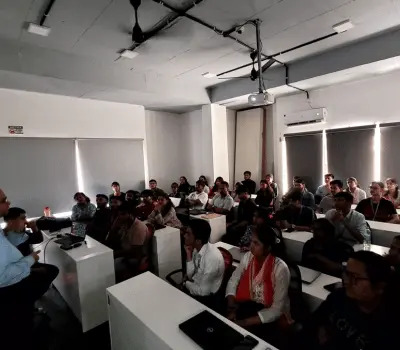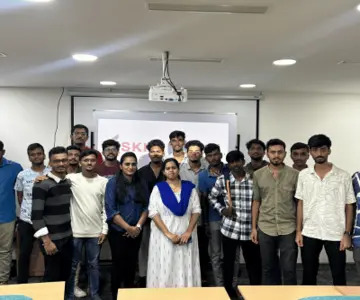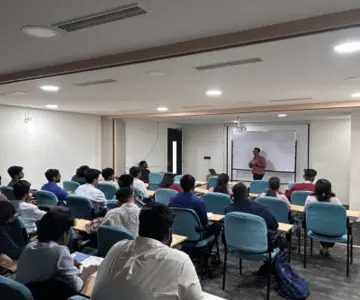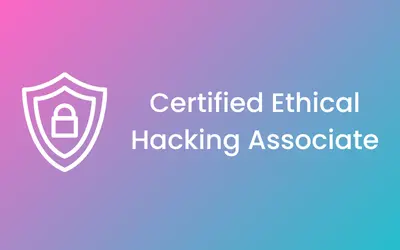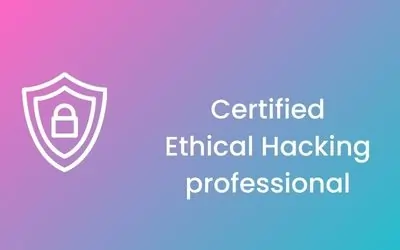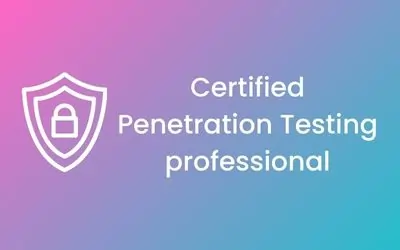- Practical Hacking Skills: The training focuses on real ethical hacking techniques, enabling learners to perform penetration testing, vulnerability scanning, and controlled attacks through hands-on labs and real-world ethical hacking scenarios.
- Industry-Aligned Curriculum: The curriculum is designed around current ethical hacking practices, covering network attacks, web application vulnerabilities, system exploitation methods, and security testing techniques used by professional ethical hackers.
- Expert Mentors: Learners are trained by experienced ethical hacking professionals who bring real-world attack simulation experience, helping students understand how hackers think and how organizations identify and fix vulnerabilities.
- Live Attack Labs: The course includes live hacking labs where learners practice exploiting vulnerabilities in safe environments, gaining confidence in ethical hacking tools, attack methodologies, and reporting security weaknesses effectively.
- Tool-Based Learning: Students gain hands-on experience with industry-standard ethical hacking tools used for reconnaissance, exploitation, vulnerability assessment, and penetration testing, ensuring practical readiness for real-world ethical hacking roles.
- Certification Readiness: The training prepares learners for recognized ethical hacking certifications by strengthening core concepts, practical skills, and tool proficiency required to clear certification exams and technical assessments.
- Flexible Learning: Skillfloor offers flexible learning options, allowing students and working professionals in Chennai to balance ethical hacking training with academic schedules or job commitments without compromising learning quality.
- Career Support: Learners receive career guidance focused on ethical hacking roles, including resume building, technical interview preparation, and understanding job requirements for penetration testing and ethical hacking positions.
- Placement Assistance: Skillfloor supports learners with placement assistance by connecting them with hiring partners seeking ethical hackers, penetration testers, and vulnerability assessment professionals across various technology-driven industries.
- Cost-Effective Training: The ethical hacking course is priced to deliver maximum value, combining expert training, practical labs, and career support, making it an affordable investment for building a long-term ethical hacking career.
Why Chennai Is a Smart Choice for an Ethical Hacking Course
Chennai has established itself as a major technology and IT services hub, making it an ideal location for learning ethical hacking. The city hosts a wide range of software companies, IT service providers, startups, and enterprise development centers that continuously invest in secure digital systems. As businesses increasingly rely on online platforms, cloud infrastructure, and data-driven applications, the demand for ethical hackers who can identify vulnerabilities and prevent cyber threats continues to rise. This industry presence creates strong career exposure and learning relevance for students pursuing ethical hacking in Chennai.
Another key advantage of Chennai is its strong education and training ecosystem. The city is known for its technical institutions, skilled trainers, and practical learning culture, which supports hands-on ethical hacking education. Learners benefit from structured courses, access to real-world lab environments, and opportunities to develop problem-solving skills through simulated attack scenarios. Compared to some other metro cities, Chennai also offers a relatively affordable cost of living, allowing students and working professionals to invest in skill development without excessive financial burden.
Chennai’s rapid adoption of cloud computing, fintech platforms, healthcare technology, and e-commerce systems further strengthens the need for penetration testing and vulnerability assessment professionals. Ethical hacking skills are increasingly required to meet compliance standards, protect sensitive data, and maintain business continuity. Learning ethical hacking in Chennai enables students to align their skills with real industry needs, build practical expertise, and prepare for long-term career growth in this high-demand and evolving field.
Career Opportunities After an Ethical Hacking Course
An Ethical Hacking course opens the door to a wide range of career opportunities in organizations that prioritize system security and data protection. As cyber threats continue to evolve, businesses rely on skilled ethical hackers to proactively identify vulnerabilities and prevent security breaches. Completing ethical hacking training equips learners with practical skills in penetration testing, vulnerability assessment, and system security, making them suitable for both technical and consulting roles across industries.
-
Ethical Hacker - Identify and exploit system vulnerabilities legally to help organizations strengthen their security defenses and reduce the risk of cyberattacks.
-
Penetration Tester - Conduct simulated cyberattacks on networks, applications, and systems to evaluate security strength and provide actionable remediation reports.
-
Vulnerability Assessment Specialist - Focus on scanning and analyzing systems to detect security weaknesses and prioritize risks based on severity and impact.
-
Security Analyst - Monitor, analyze, and respond to security incidents while supporting preventive security measures using ethical hacking insights.
-
Application Security Tester - Test web and mobile applications for security flaws such as injection attacks, authentication issues, and data exposure risks.
-
Network Security Engineer - Secure enterprise networks by evaluating firewalls, protocols, and access controls through ethical hacking techniques.
-
Bug Bounty Hunter - Participate in authorized vulnerability disclosure programs by responsibly reporting security flaws to organizations for rewards.
-
Freelance Ethical Hacker - Provide independent security testing services, including penetration testing and vulnerability assessments, on a contract or project basis.
-
Security Consultant - Advise organizations on improving security posture by assessing risks, recommending controls, and supporting compliance initiatives.
-
Red Team Member - Simulate advanced attack scenarios to test an organization’s detection, response, and overall cyber resilience.
Ethical hacking offers long-term career growth due to its relevance across IT services, finance, healthcare, e-commerce, and government sectors. With continuous advancements in technology and increasing cyber risks, professionals trained in ethical hacking can build stable, high-impact careers that evolve alongside the digital environment.
Internship & Placement Support in Chennai
Skillfloor’s Ethical Hacking course in Chennai goes beyond technical training to provide comprehensive internship and placement support, ensuring students are fully prepared for the professional cybersecurity landscape. The program emphasizes practical exposure through hands-on labs, live hacking simulations, and real-world security projects. These activities not only reinforce theoretical knowledge but also help learners gain confidence in applying ethical hacking techniques, vulnerability assessment, and penetration testing in real environments.
In addition to technical preparation, Skillfloor offers career guidance, resume building, and interview preparation tailored for ethical hacking roles. Students are trained to present their skills effectively to potential employers, understand role expectations, and perform confidently in technical interviews. The institute maintains strong partnerships with IT companies, cybersecurity firms, and startups in Chennai, providing students with access to internships, freelance opportunities, and job placements that align with their skills and career goals.
Placement support at Skillfloor also focuses on career progression and long-term growth. Students are guided to pursue roles such as Ethical Hacker, Security Analyst, Penetration Tester, Vulnerability Assessment Specialist, or Red Team Member, depending on their expertise. By combining practical skill-building with dedicated placement assistance, learners can enter the cybersecurity workforce with confidence, industry-recognized credentials, and hands-on experience, positioning themselves for successful, high-growth careers in ethical hacking.
Ethical Hacking Salary Scope in India
Ethical hacking is one of the fastest-growing and highly rewarding career paths in India. With cybercrime increasing by over 15% annually, organizations in IT, finance, healthcare, e-commerce, and government sectors are actively seeking skilled ethical hackers to protect critical systems and sensitive data. This growing demand has created a strong salary potential and multiple career opportunities for certified ethical hacking professionals.
-
Entry-Level Salaries: Freshers or beginners with basic certifications and hands-on exposure can expect salaries ranging from ₹3–5 lakhs per year. Roles at this level often include junior ethical hacker, vulnerability assessment trainee, or security analyst in small-to-medium IT companies.
-
Mid-Level Salaries: Professionals with 2–5 years of experience in penetration testing, network security, and web application security can earn ₹6–12 lakhs per year. These roles often involve conducting security audits, leading testing projects, and mentoring junior ethical hackers.
-
Senior-Level Salaries: Experienced ethical hackers, senior penetration testers, security consultants, or red team specialists can command salaries of ₹15–25 lakhs per year or higher, particularly in multinational companies, cybersecurity firms, and organizations with large-scale IT infrastructures.
-
Freelancing & Bug Bounties: Beyond fixed salaries, ethical hackers can also earn through freelance projects, bug bounty programs, or consulting assignments. Platforms like HackerOne, Bugcrowd, and corporate vulnerability disclosure programs allow skilled ethical hackers to earn additional income ranging from tens of thousands to lakhs of rupees per project, depending on complexity.
-
Long-Term Growth: Ethical hacking offers continuous career progression. Professionals can move into leadership roles such as Chief Information Security Officer (CISO) or Cybersecurity Manager, with salaries exceeding ₹30 lakhs per year, while maintaining opportunities for freelance and consultancy work.
-
Overall Scope: Ethical hacking in India combines high earning potential, job security, and career flexibility, making it one of the most attractive paths for students, IT professionals, and career switchers entering the cybersecurity domain.
Why Learn Ethical Hacking at Skillfloor
Choosing the right training provider is one of the most important decisions for anyone beginning a career in ethical hacking. Skillfloor offers a structured and industry-aligned ethical hacking program that equips learners with practical skills, real-world exposure, and job-oriented training. The focus is on applied learning through hands-on labs, attack simulations, and security projects that mirror actual challenges faced by organizations. This approach helps students build confidence, technical expertise, and problem-solving abilities that are essential for success in cybersecurity roles.
At Skillfloor, learners benefit from experienced instructors who bring practical insights and industry perspectives into every session. Training includes not just theoretical concepts but also guided use of ethical hacking tools, vulnerability assessment techniques, and penetration testing frameworks widely used by professionals. Mentorship, doubt-clearing support, and practice-focused sessions ensure that students develop a deep understanding of ethical hacking concepts and how to apply them in real environments.
In addition to technical mastery, Skillfloor emphasizes career readiness, helping learners prepare for interviews, build strong security-focused resumes, and understand industry expectations for ethical hacking roles. With placement assistance, certification preparation, and ongoing career guidance, learners are positioned to confidently enter roles such as Ethical Hacker, Penetration Tester, Security Analyst, and Vulnerability Assessment Specialist. Learning ethical hacking at Skillfloor combines the right mix of practical training, expert support, and career focus to create a pathway to long-term success in the cybersecurity domain.
Ethical Hacking Course Syllabus Overview
An ethical hacking course equips learners with the knowledge and skills needed to identify, analyze, and secure vulnerabilities in digital systems. A well-structured syllabus covers foundational concepts, practical techniques, and advanced security testing practices that are essential for real-world penetration testing and ethical hacking roles. Ethical hacking training blends theory with hands-on practice, giving learners confidence in using tools and methodologies to assess and secure networks, applications, and systems.
Below is an overview of the core modules typically covered in an Ethical Hacking syllabus based on industry standards and common training frameworks:
|
Module
|
Topics Covered
|
Skills Gained
|
|
Introduction to Ethical Hacking
|
What is ethical hacking, types of hackers, legality, and ethics
|
Understanding ethical hacking principles and legal boundaries
|
|
Network Security Fundamentals
|
Networking basics, firewalls, IDS/IPS, secure designs
|
Network architecture analysis and network defence insights
|
|
Information Gathering & Reconnaissance
|
Footprinting, OSINT, scanning, port, and service enumeration
|
Identifying attack surface and security weaknesses
|
|
System Hacking & Exploitation
|
Exploiting vulnerabilities, privilege escalation, and session hijacking
|
Gaining controlled access and understanding attack techniques
|
|
Web Application Security
|
OWASP Top 10, SQLi, XSS, and authentication flaws
|
Testing and securing web apps against common vulnerabilities
|
|
Wireless & Network Attacks
|
Wi-Fi encryption testing, rogue APs, packet analysis
|
Assessing and securing wireless networks
|
|
Cryptography & Data Security
|
Encryption, hashing, PKI, secure data practices
|
Protecting data confidentiality and integrity
|
|
Social Engineering & Phishing
|
Human-based attacks, phishing simulations
|
Understanding and mitigating social engineering risks
|
|
Penetration Testing & Reporting
|
Phases of testing, tools like Nmap/Burp Suite, and documentation
|
Conducting tests and creating professional vulnerability reports
|
|
Incident Response & Forensics
|
Incident lifecycle, evidence gathering, and SIEM usage
|
Responding to breaches and analyzing incidents
|
Ethical hacking syllabi are designed so learners move from basic concepts to advanced security testing techniques, combining theoretical understanding with extensive practical exposure. Each module builds critical skills from reconnaissance and vulnerability scanning to exploitation and reporting, ensuring students can apply ethical hacking practices effectively in professional environments.
Transform Your Skills Into a High-Demand Career
In today’s digital age, cyber threats are growing exponentially, making skilled ethical hackers an essential asset for organizations across IT, finance, healthcare, e-commerce, and government sectors. Completing an ethical hacking course equips learners with the knowledge, tools, and practical experience needed to identify vulnerabilities, secure systems, and implement proactive security measures. With hands-on labs, real-world simulations, and industry-aligned training, students gain not only technical expertise but also the confidence to tackle complex cybersecurity challenges effectively.
Beyond technical mastery, ethical hacking training opens multiple pathways for career advancement. Learners can pursue roles such as Ethical Hacker, Penetration Tester, Security Analyst, Vulnerability Assessment Specialist, Red Team Member, or Cybersecurity Consultant. Opportunities extend to freelancing, bug bounty programs, and consulting projects, allowing professionals to supplement their income while gaining diverse experience. With the right mentorship, certifications, and placement support, students are positioned to enter the workforce confidently and thrive in high-demand cybersecurity roles.
Investing in ethical hacking education is more than learning a skill; it’s a gateway to a secure, high-growth, and future-proof career. The combination of technical expertise, industry recognition, and practical exposure ensures long-term relevance and opens doors to leadership roles like Chief Information Security Officer (CISO) or Cybersecurity Manager. By choosing to train in ethical hacking today, learners are not just preparing for jobs; they are preparing to shape the digital security landscape of tomorrow, making themselves indispensable in an increasingly connected and vulnerable world.
















